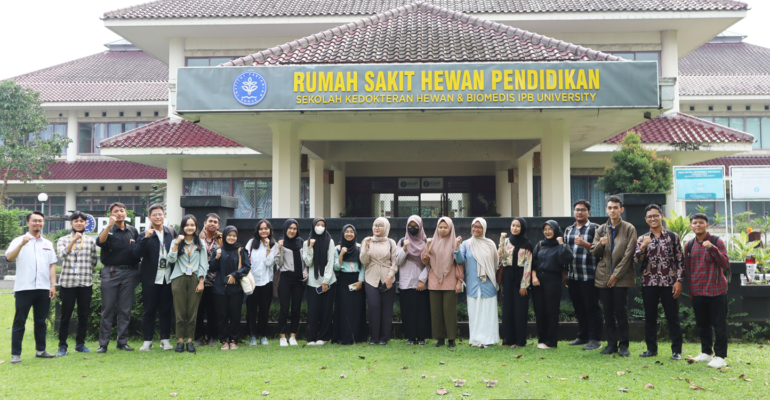School of Veterinary Medicine and Biomedical Sciences (SKHB) IPB University Holds Laboratory Animal Handling Training for Students

School of Veterinary Medicine and Biomedical Sciences (SKHB) IPB University in collaboration with the Directorate of Student Affairs (Ditmawa) held a Basic Training on Handling Laboratory Animals. This training was attended by 23 students from various faculties at IPB University who will carry out the Student Creativity Program (PKM) and the Student Palm Oil Research Competition in 2024.
In his speech, Dr drh Amrozi as Dean of SKHB IPB University said, this training was held as a form of commitment and support to achieve the highest achievement in the PKM competition every year. In addition, the animal ethics training given specifically for PKM students is a golden opportunity because not all students have the opportunity to get this training material.
“The purpose of this training is to provide knowledge to IPB University students in research using laboratory animals. By participating in this training, hopefully it will be a provision of knowledge for all participants and can facilitate the implementation of the research to be carried out,” he said.
On the first day, participants get valuable material from experts. Prof drh Arief Boediono, PAVet (K) opened the session with the material “Introduction to Ethical Clearance and Explanation of Animal Ethics Form”. He explained, ethical clearance is needed in every research that uses animals because it contains substances that guarantee that experimental animals will be treated properly.
“The principle of treating experimental animals well refers to 3R and 5F. The 3R principle includes Replacement, Reduction, and Refinement. The rule of replacement or replacement is a principle to replace the type of experimental animal with another type of animal with a lower taxonomy if possible without reducing the essence of the research to be carried out,” he explained.
The reduction principle is an attempt to reduce the number of experimental animals needed for research. This can be achieved by making an effective research design and calculating the right statistics so that the number of experimental animals required is minimal.
Meanwhile, continued Prof Arief, the rule of refinement is to provide improved treatment for experimental animals so that their welfare can be improved. This can be achieved in several ways such as providing a comfortable environment for animals during maintenance, minimising research procedures that are painful for animals, and providing adequate care after treatment is carried out on experimental animals.
While the application of the 5F principle includes Freedom from hunger and thirst, Freedom from pain, injury, and disease; Freedom from fear and distress; Freedom to express normal behaviour; and Freedom from discomfort.
“The 3R and 5F principles are expected to be fulfilled by completing the animal ethics filling checklist form. The form contains substances that help to fulfil the feasibility aspects of using laboratory animals in a research plan from the beginning of animal supply, treatment, to animal handling at the end of the experiment,” he said.
The second day was focussed on hands-on practice of laboratory animal handling. Students have the opportunity to learn animal handling and restraining techniques, drug applications, euthanasia, surgery, and sample handling. This activity was also assisted by students of SKHB IPB University and employees of the Laboratory Animal Management Unit (UPHL).
On the last day, the participants presented the results of filling out the animal ethics form to the assessors, who were also resource persons. Evaluation is carried out to ensure that the participants have reached the expected training standards.
“This training provides us with very useful knowledge about laboratory animals and the procedures for submitting research ethics. This is certainly an added value for our PKM research,” said one of the participants enthusiastically. (AP/Rz) (IAAS/IAN)



